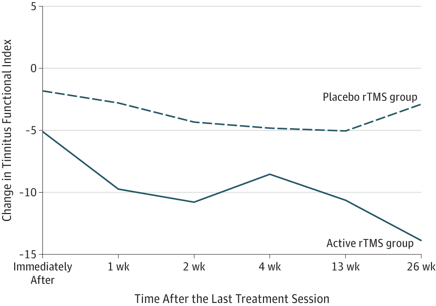If you suffer from tinnitus, or chronic ringing in the ears, you are not alone. About 21 million adults in the US have dealt with tinnitus in the past year and one third of them had near-constant symptoms. Tinnitus is associated with anxiety, depression, sleep disturbance, and reduced quality of life. It is difficult to treat, with very limited treatment options.
Transcranial magnetic stimulation (TMS) is FDA approved for the treatment of depression, but it is also a promising treatment for tinnitus. Tinnitus is thought to involve two key problems: first, the auditory cortex (part of the brain responsible for processing sound) is overactive, leading to the ringing sound. Second, the part of the brain that would usually help you tune out or ignore the unhelpful information does not ignore the sound and in fact begins to pay even more attention to it. TMS can target both issues by reducing the overactivity of the auditory cortex and enhancing the activity of the “noise cancelling” network.
Overall, it seems that between 20 to 50% of patients receiving TMS for tinnitus will have some improvement. The benefits can last anywhere from weeks up to six months after treatment. The graph below shows a greater decrease in tinnitus symptoms over time in patients receiving real TMS (solid line) compared to patients receiving a sham or placebo treatment (dashed line). Remarkably, patients continued to benefit even up to 6 months after the last treatment session (RL Folmer et al, 2015).

Most insurance plans cover TMS treatments only for the treatment of depression, and do not cover TMS for tinnitus at this time. If you have both tinnitus and depression, treatment may be covered by insurance. When insurance does not cover treatment, UCLA is pleased to offer very affordable out-of-pocket rates. Please see our flyer below or contact us to learn more.